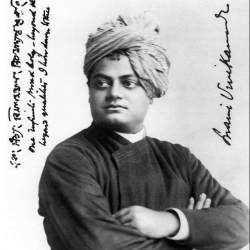
Swami Vivekananda
| Date of Birth | : | 12 Jan, 1863 |
| Date of Death | : | 04 Jul, 1902 |
| Place of Birth | : | Kolkata, India |
| Profession | : | Philosopher |
| Nationality | : | Indian |
Swami Vivekananda, born Narendranath Datta, was an Indian Hindu monk, philosopher, author, religious teacher, and the chief disciple of the Indian mystic Ramakrishna.
Biography
Born into an upper-middle-class family of the Kayastha (scribes) caste in Bengal, he was educated at a Western-style university where he was exposed to Western philosophy, Christianity, and science. Social reform became a prominent element of Vivekananda’s thought, and he joined the Brahmo Samaj (Society of Brahma), dedicated to eliminating child marriage and illiteracy and determined to spread education among women and the lower castes. He later became the most-notable disciple of Ramakrishna, who demonstrated the essential unity of all religions.
Always stressing the universal and humanistic side of the Vedas, the oldest sacred texts of Hinduism, as well as belief in service rather than dogma, Vivekananda attempted to infuse vigour into Hindu thought, placing less emphasis on the prevailing pacifism and presenting Hindu spirituality to the West. He was an activating force in the movement to promote Vedanta philosophy (one of the six schools of Indian philosophy) in the United States and England. In 1893 he appeared in Chicago as a spokesman for Hinduism at the World’s Parliament of Religions and so captivated the assembly that a newspaper account described him as “an orator by divine right and undoubtedly the greatest figure at the Parliament.” Thereafter he lectured throughout the United States and England, making converts to the Vedanta movement.
On his return to India with a small group of Western disciples in 1897, Vivekananda founded the Ramakrishna Mission at the monastery of Belur Math on the Ganges (Ganga) River near Calcutta (now Kolkata). Self-perfection and service were his ideals, and the order continued to stress them. He adapted and made relevant to the 20th century the very highest ideals of the Vedantic religion, and, although he lived only two years into that century, he left the mark of his personality on East and West alike.
Death
On 4 July 1902 (the day of his death), Vivekananda awoke early, went to the monastery at Belur Math and meditated for three hours. He taught Shukla-Yajur-Veda, Sanskrit grammar and the philosophy of yoga to pupils, later discussing with colleagues a planned Vedic college in the Ramakrishna Math. At 7:00 pm Vivekananda went to his room, asking not to be disturbed; he died at 9:20 p.m. while meditating. According to his disciples, Vivekananda attained mahasamādhi; the rupture of a blood vessel in his brain was reported as a possible cause of death. His disciples believed that the rupture was due to his brahmarandhra (an opening in the crown of his head) being pierced when he attained mahasamādhi. Vivekananda fulfilled his prophecy that he would not live forty years. He was cremated on a sandalwood funeral pyre on the bank of the Ganga in Belur, opposite where Ramakrishna was cremated sixteen years earlier.
Quotes
You have to grow from the inside out. None can teach you, none can make you spiritual. There is no other teacher but your own soul.
In a conflict between the heart and the brain, follow your heart.
In a day, when you don't come across any problems - you can be sure that you are travelling in a wrong path
The great secret of true success, of true happiness, is this: the man or woman who asks for no return, the perfectly unselfish person, is the most successful.
All power is within you; you can do anything and everything. Believe in that, do not believe that you are weak; do not believe that you are half-crazy lunatics, as most of us do nowadays. You can do any thing and everything, without even the guidance of any one. Stand up and express the divinity within you.
The greatest religion is to be true to your own nature. Have faith in yourselves.
The greatest sin is to think yourself weak
Anything that makes weak - physically, intellectually and spiritually, reject it as poison.
Dare to be free, dare to go as far as your thought leads, and dare to carry that out in your life.
We are what our thoughts have made us; so take care about what you think. Words are secondary. Thoughts live; they travel far.
